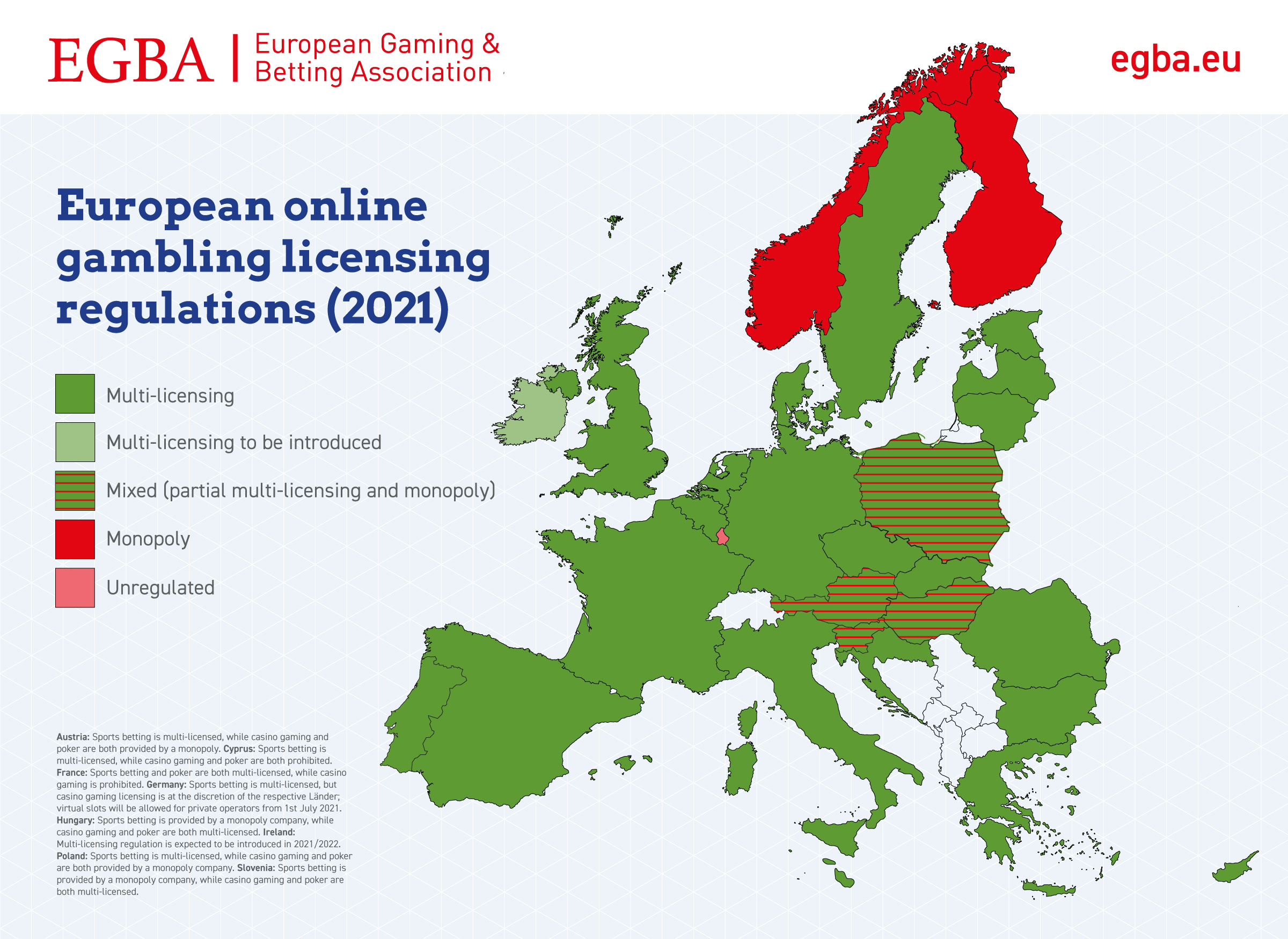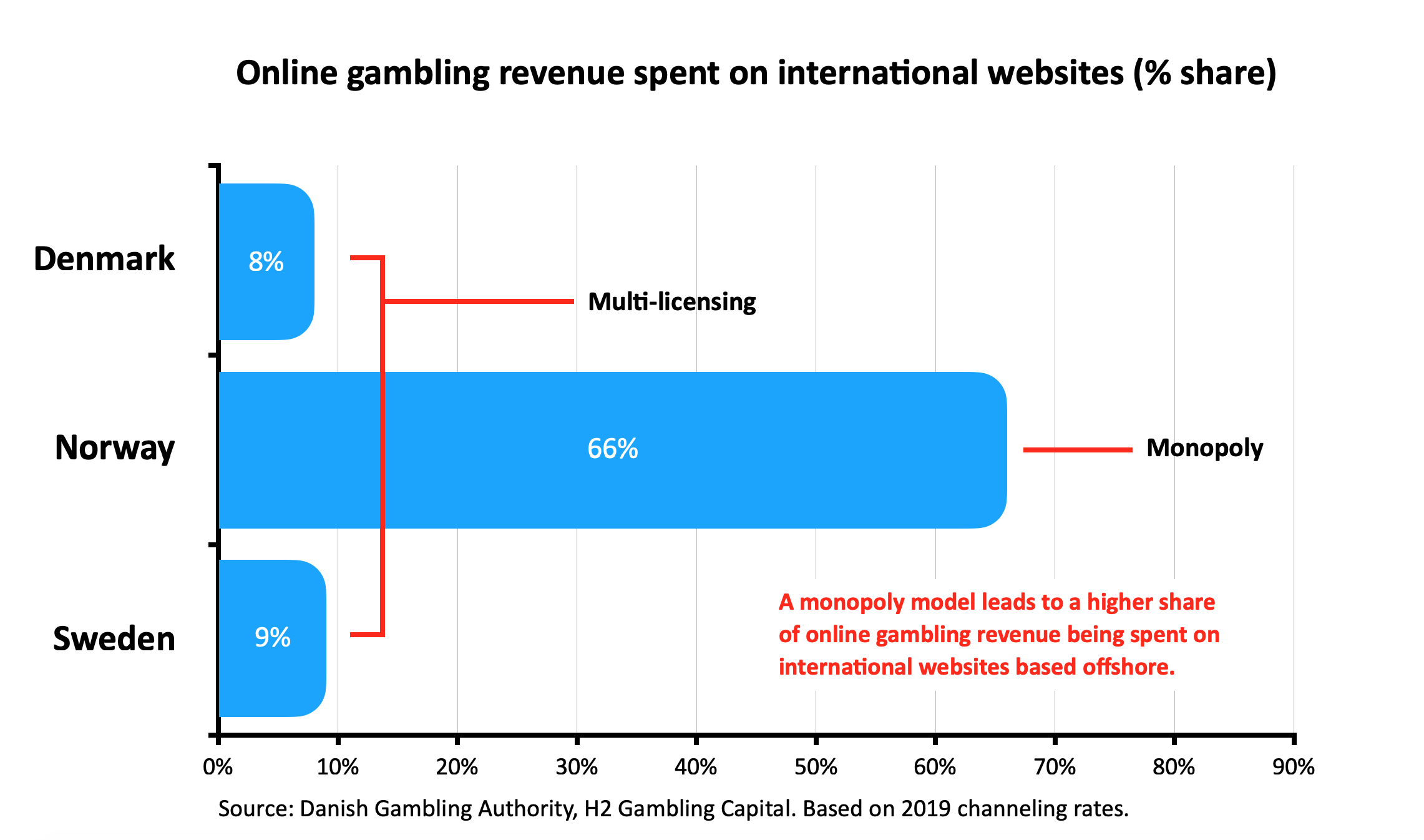Norway: the fallacy of one of Europe’s last online gambling monopolies
22.04.2021
Norway is losing control of its online gambling market as players reject the state-owned monopoly and flock to international websites in search of greater choice. But multi-licensing offers a solution.
Gambling has a long-established presence in Norwegian culture. In Norse mythology the trickster god Loki won a famous bet, Loki’s Wager, which illustrates how a logical fallacy can invalidate an argument. The tale made me think about another fallacy in Norway’s relationship with online gambling: that its state-owned monopoly is necessary to better control online gambling activity in the country.
Norway justifies its monopoly under the premise that the state is better placed, than private companies, to control online gambling and protect players from problem gambling. But this argument, like Loki’s Wager, is based on a fallacy: it’s a country’s regulations and consumer protections which control online gambling and protect players, not whether there is a monopoly or not.
Monopolies naturally restrict choice and are incompatible with the nature of online gambling which is, like many digital sectors, a strongly consumer-driven market. It’s a lesson learned elsewhere in Europe but equally true in Norway. Its consumers are internet savvy, they’re sensitive to prices and innovation, they actively search for greater choice and alternatives – and these are readily available on the internet.
Norway’s monopoly has led to less control over the country’s online gambling activity, not more
That’s why it’s not surprising that so many Norwegians look beyond the monopoly and choose to play on international websites which offer them better choice and prices than the monopoly. It is estimated that 66% of Norway’s online gambling activity now takes place on international websites,[1] meaning the country has lost control of over half of its online gambling market, is losing out on about 2 billion NOK in additional tax revenues each year,[2] and many of its gamblers are not protected by Norwegian laws. This is a significant problem for ensuring the monopoly does what it says: controlling online gambling and protecting players. If Norwegians play with international websites there is no way for the state to control their activity or protect them.
Norwegians are no better protected by their monopoly than other Europeans
Despite player protection being the key objective of its monopoly, Norway’s problem gambling rate has doubled in 7 years[3] and is more than four times higher than in Spain or the UK,[4] countries which don’t have a gambling monopoly. There’s therefore no compelling evidence that Norwegians are in any way better protected by their monopoly than Europeans who live in countries which don’t have a monopoly. This brings into further question the success of the country’s monopoly model.

Multi-licensing is a more effective way to regulate online gambling
The flaws of the monopoly model are well known and that’s why nearly every other European country has replaced monopolies with a more effective multi-licensing model for regulating online gambling. By allowing more companies to obtain a license to be on the market, multi-licensing creates the necessary competition and choice to encourage more gamblers to play on the websites that are actually licensed by their local authorities, rather than on websites which aren’t licensed and fall outside the control and supervision of their authorities. In a multi-licensed market, licensed companies must apply a range of regulations and consumer protections which are part of the local licensing rules. Compliance with these licensing rules is monitored and enforced by the country’s gambling regulator, ensuring that the responsibility for controlling the level of consumer protection remains with the authorities.
Other Nordic countries benefited from replacing their online gambling monopolies
Denmark and Sweden both successfully replaced their online gambling monopolies with multi-licensing and achieved significantly positive results.[5] While the regulations in both countries are not perfect and can be improved upon, the introduction of multi-licensing allowed them both to significantly reduce the amount of their online gambling activity taking place on international websites and are now in a much better position to control their online gambling markets. They’re now generating more tax revenues from online gambling and more of their gamblers are protected under their national laws, which is particularly important for addressing problem gambling. Both countries also proved that it is possible for private companies and former monopoly companies to co-exist in a multi-licensed market without jeopardising state monopoly revenues.[6]
The benefits of replacing Norway’s monopoly are clear. A multi-licensing model would allow Norway to significantly reduce the amount of its online gambling activity taking place on international websites – from 66% to 5% – in the first year of multi-licensing.[7] Of course, there would be challenges in doing so, but the benefits are far too great to ignore.
The time has come for Norway to have a fundamental rethink about how it regulates online gambling. It’s clear that Norwegians increasingly choose not to play with the monopoly, and it’s better to meet, rather than ignore, their demand for alternatives. Experience shows us that online gambling monopolies inevitably fail, and Norway should look to Denmark and Sweden where multi-licensing – while not perfect – proved to be a much more optimum model for controlling online gambling. Only by doing the same can Norway correct the fallacy at the heart of its monopoly and failing online gambling regulation.
Maarten Haijer
Secretary General, European Gaming and Betting Association (EGBA)
About the European Gaming and Betting Association (EGBA)
The European Gaming and Betting Association (EGBA) is the Brussels-based trade association representing the leading online gaming and betting operators established, licensed and regulated within the EU, including bet365, Betsson Group, Entain, Kindred Group, and William Hill. The Swedish Trade Association for Online Gambling (BOS) is also an affiliate member. EGBA works together with national and EU regulatory authorities and other stakeholders towards a well-regulated and well-channeled online gambling market which provides a high level of consumer protection and takes into account the realities of the internet and online consumer demand. EGBA member companies meet the highest regulatory standards and have 145 online gambling licenses to provide their services to 16 million customers in 17 different European countries.
[1] International websites had a 66% share of Norway’s online gross gaming revenue (GGR) in 2019, H2 Gambling Capital.
[2] The Norwegian Online Betting Association estimates that the introduction of multi-licensing in Norway would enable the authorities to much better control and tax the country’s online gambling activity and, alongside a gambling tax rate of 15%, would generate about 2 billion NOK in additional tax revenue for the state each year, based on today’s online gambling market.
[3] 55,000 players, or 1.4% of the population, in Norway are classified as problem gamblers, University of Bergen (2020).
[4] Spain and the UK both had problem gambling rates of 0.3% of their population in 2020.
[5] The introduction of multi-licensing in Denmark in 2012 led to a reduction in the amount of its online gambling activity taking place on international websites – from 28% in 2012 to 8% in 2019. Sweden introduced multi-licensing in 2019 and, by doing so, reduced the amount of its online gambling activity taking place on international websites – from 56% in 2016 to 9% in 2019. Based on online gross gaming revenue (GGR), Danish Gambling Authority (2020).
[6] In Denmark, Danske Spil’s revenues nearly trebled – from DKK 0.75bn in 2011 to DKK 2.1bn in 2019 – since multi-licensing was introduced, Gambling Compliance (2020).
[7] Based on online gross gaming revenue (GGR), Norwegian Online Betting Association.

